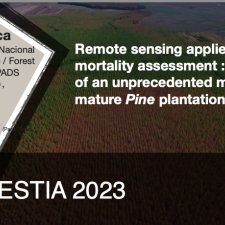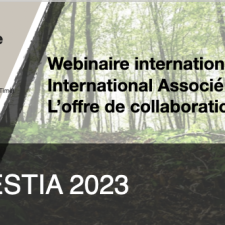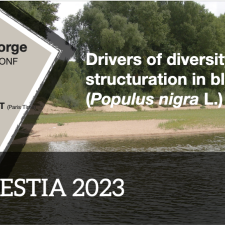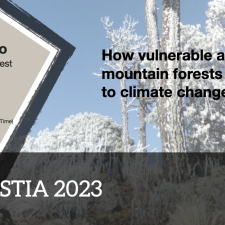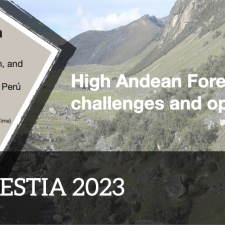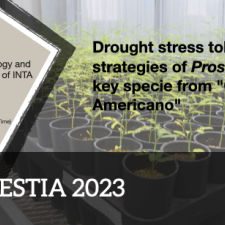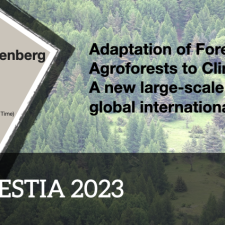Notice
#6 Community-based forest management in Mexico and climate change mitigation
- document 1 document 2 document 3
- niveau 1 niveau 2 niveau 3
Descriptif
Abstract
The functional role of forests ecosystems in climate change mitigation is well recognized by fixing atmospheric carbon (C). However, they are also vulnerable to natural and human-induced disturbances. Forests may act as sinks or sources depending on the balance between atmospheric CO2 emissions and removals. Nonetheless, C dynamics in forest ecosystems are complex and multifactorial. Understanding these dynamics is essential for managing forests sustainably and preserving C stocks. Questions such as to what extent does the carbon cycle change when a forest is harvested? What is the behavior of managed forests for timber production in terms of CO2 emissions and removals? Are the forests under community-based forest management sustainable? are necessary to answer, to determine precisely the magnitude to which forests under forest management are capable of removing atmospheric CO2, and therefore mitigating climate change. Here I will use as a model the Intensive Carbon Monitoring Site Atopixco in central Mexico, to show some results regarding C dynamics in intensively managed forest for timber production. The aim of this site is to generate detailed information regarding C stocks and flux rates that may not be easily quantified over large areas, and to analyze processes of CO2 uptake and release that can help explain observed changes that result from forest management activities and natural disturbances. Of particular interest is the community-based forest management for timber production in Mexico, since most of such forested land is owned by ejidos and communities, where they are actively involved in decision-making regarding forestry operations and forest conservation.
Presenter
Gregorio Ángeles-Pérez is a professor at Postgrado en Ciencias Forestales, Colegio de Postgraduados in Mexico. He is interested in studying the structure and function of forest ecosystems, and the mechanisms involved in their response to natural and human-induced disturbances. Particular topics are the mechanisms that allow species coexistence, biogeochemical cycles, and the role of sustainable forest management in climate change mitigation. He is responsible for the operation of the “Intensive Carbon Monitoring Site Atopixco”, which is part of the Mexican Intensive Carbon Monitoring Sites (Mex-SMIC, Spanish acronym) network.
Intervention / Responsable scientifique
Thème
Dans la même collection
-
#7 Remote sensing applied to forest mortality assessment : the case study of an unprecedented morta…
GaticaGabrielSEMINAR # 7 « Remote sensing applied to forest mortality assessment : the case study of an unprecedented mortality event in mature Pine plantations in Argentina » Dr. Gabriel Gativa CIGEOBIO
-
Webinaire international – Laboratoire International Associé FORESTIA
RozenbergPhilippePortéAnnabelJesúsVargas-HernándezGuillerminaDalla-SaldaFernandezMaria-ElenaMarcucci PoltriSusana NoemiDuplex France-Argentine à l’occasion du 5ème anniversaire du Laboratoire international associé FORESTIA
-
#5 Drivers of diversity structuration in black poplar (Populus nigra L.)
JorgeVéroniqueSEMINAR #5 "Drivers of diversity structuration in black poplar (Populus nigra L.)" Dr Véronique Jorge, UMR BIOFORA, INRAE/ONF, Orléans September 8th, 3pm CET (Paris Time)
-
#4 How vulnerable are the high mountain forests of Mexico to climate change ?
Gómez GuerreroArmandoSEMINAR # 4 "How vulnerable are the high mountain forests of Mexico to climate change ?" Dr Armando Gómez Guerrero Graduate program in Forest Science, Colegio de Postgraduados, Mexico
-
#3 High Andean Forests: challenges and opportunities
Boza EspinozaTatianaSEMINAR # 3 « High Andean Forests: challenges and opportunities » Tatiana Boza Espinoza Institute for Nature, Earth, and Energy (INTE), Pontificia Universidad Católica del Perú May 19th,
-
#2 Drought stress tolerance strategies of Prosopis alba, a key specie from "Gran Chaco Americano"
DiegoLopez LauensteinSEMINAR # 2 : Drought stress tolerance strategies of Prosopis alba, a key specie from "Gran Chaco Americano", Diego López Lauenstein, Institute of Plant Physiology and Plant Genetic Resources of INTA
-
#1 Adaptation of Forests and Agroforests to Climate Change: A new large-scale, long-term, global in…
RozenbergPhilippeSEMINAR # 1 : "Adaptation of Forests and Agroforests to Climate Change: A new large-scale, long-term, global international initiative" Philippe Rozenberg (INRAE Val de Loire, Orléans, France)


